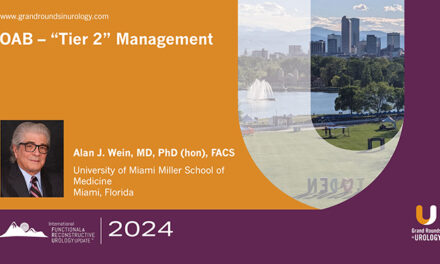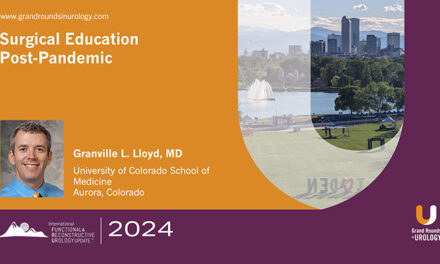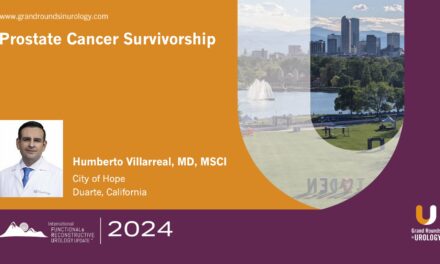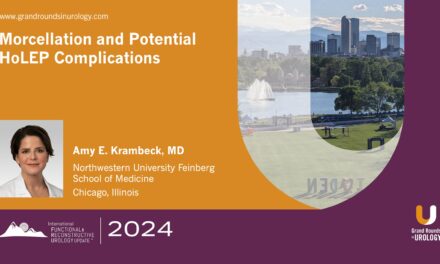Wesley A. Mayer, MD, presented “Programmatic and Institutional Paradigms for Building and Sustaining a Successful Wellness Program” at the 27th Annual Innovations in Urologic Practice conference on September 22nd, 2023.
How to cite: Mayer, Wesley A. “Programmatic and Institutional Paradigms for Building and Sustaining a Successful Wellness Program.” September 2023. Accessed Jun 2025. https://grandroundsinurology.com/programmatic-and-institutional-paradigms-for-building-and-sustaining-a-successful-wellness-program/
Programmatic and Institutional Paradigms for Building and Sustaining a Successful Wellness Program – Summary
Wesley A. Mayer, MD, presents actionable programmatic and institutional paradigms for building and sustaining a successful wellness program within one’s practice or institution while avoiding burnout. He begins by defining the elements of burnout, their impact on institution-wide productivity, and the high rate of burnout in the field of Urology.
Dr. Mayer then turns to the ACGME’s well-being requirements for Urology programs. While these requirements were intended to preserve the wellness of faculty and residents in theory, Dr. Mayer highlights that the lack of specific goals in institutional wellness programs can lead to “hedonistic” initiatives and inconsistent results.
Dr. Mayer then turns to how his own institution, the Scott Department of Urology at Baylor Medical School, sought to consistently address burnout. He outlines the paradigm created by his department, the tools they used to evaluate the success of their efforts, and the results.
He concludes by enumerating the steps other institutions can take to implement similar anti-burnout programs. He provides suggestions for national-level interventions, and reinforces the need for intentionality behind wellness programs.
About The 27th Annual Innovations in Urologic Practice:
Presented by co-chairs Mohit Khera, MD, MBA, MPH, and Michael Coburn, MD, FACS, the Innovations in Urologic Practice conference provides a detailed review and commentary on multiple genitourinary and urologic diseases. Among the featured oncological topics are bladder cancer and immunotherapies, as well as upper tract cancer management, prostate cancer, including state-of-the-art imaging, focal therapy, and MRI. Experts also discuss new tools and techniques for nephrectomy and treating advanced renal cell carcinoma. In terms of general urological approaches, the conference also includes pelvic reconstruction and trauma; men’s health topics like male infertility, andrology, and sexual dysfunction; OAB and voiding dysfunctions; and ways to diagnose and treat infections in the urology patient.
For further educational activities from this conference, visit our collection page.
ABOUT THE AUTHOR
Wesley A. Mayer, MD, is an associate professor of urology, the vice chair for education of the Scott Department of Urology, and an assistant dean of graduate medical education at Baylor College of Medicine in Houston, Texas. Dr. Mayer earned his medical degree from Baylor College of Medicine, graduating with highest honors. He completed his internship in general surgery and his urology residency at the University of Pennsylvania in Philadelphia, Pennsylvania. Dr. Mayer is fellowship-trained in advanced robotic, laparoscopic, and endoscopic surgery in Baylor College of Medicine’s Scott Department of Urology.
Dr. Mayer specializes in advanced minimally invasive surgical treatments for urologic diseases including robotic, laparoscopic (including single-site), endourologic, and percutaneous surgery. He has a special interest in kidney cancer, kidney stones, upper urinary tract reconstruction, adrenal masses, and transplant urology. He has also published research and has been invited to speak on these topics at several national and international conferences. Dr. Mayer has been repeatedly selected as a “Top Urologist in Houston, Texas” in The Leading Physicians of the World and a “Top Doc” in Houstonia Magazine.





